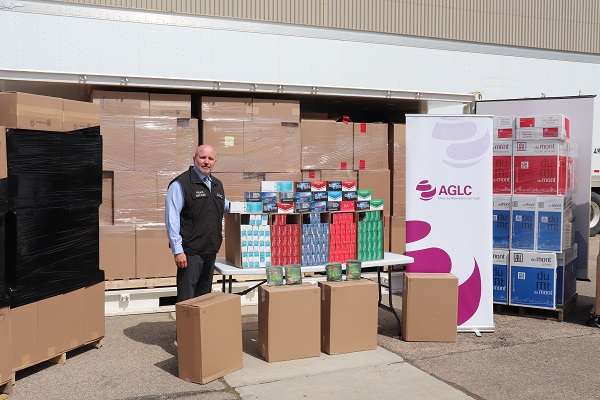Crime
Online Harms bill could see Canadians face house arrest based on citizen complaints: Constitutional lawyer

From LifeSiteNews
Constitutional lawyer Marty Moore has warned LifeSiteNews that under the proposed Online Harms Act, courts could impose restrictions on Canadians under threat of jail if there is ‘fear’ the accused may commit a ‘hate crime’ in the future.
A top constitutional lawyer has told LifeSiteNews that the most “shocking” part of the Trudeau government’s proposed “Online Harms Act” is that it could allow provincial courts to impose house arrest on Canadians over a “fear” that they may commit a “hate crime” in the future.
“Possibly the most shocking part of this Bill is the addition of section 810.012 to the Criminal Code,” Marty Moore, who serves as the Litigation Director for Charter Advocates Canada, which is fully funded by the Justice Centre for Constitutional Freedoms (JCCF), told LifeSiteNews.
“Under this new provision, a person can assert to a provincial court that they ‘fear’ someone will promote genocide or antisemitism, and that provincial court is empowered to jail a person for one year (two years if they have previously been convicted of such an offense) if they refuse to agree to court-imposed conditions.”
Moore noted that the “court-imposed conditions” could be the mandated wearing of an ankle monitor, having a curfew, or not communicating with certain people.
Similar pre-crime punitive tactics may also be carried out against Canadians for other so-called “hate” offenses unrelated to antisemitism or genocide, something Justice Minister Arif Virani, who introduced Bill C-63 into Parliament Monday, continues to defend.
“[If] there’s a genuine fear of an escalation, then an individual or group could come forward and seek a peace bond against them and to prevent them from doing certain things,” Virani said Wednesday, arguing that such tactics “would help to de-radicalize people who are learning things online and acting out in the real world violently – sometimes fatally.”
If passed, Bill C-63 will create the “Online Harms Act” and modify existing laws, including the Criminal Code and the Canadian Human Rights Act, in what the Liberals under Prime Minister Justin Trudeau claim will target certain already illegal internet content such as child sexual abuse and pornography.
However, the proposed law also seeks to target broadly defined “hate speech,” leading many Canadians to worry the bill is a trojan horse being used to usher in political censorship.
Most worryingly, the new bill will allow it so that anyone can file a complaint against another person with the Canadian Human Rights Commission for “posting hate speech online” that is deemed “discriminatory” against a wide range of so-called protected categories. The bill even includes a provision that allows the Commission to withhold the identity of the accuser from the accused, effectively paving the way for Canadians to have to defend themselves against anonymous complaints.
Moore, as reported by LifeSiteNews on February 27, previously said that the “Online Harms Act” will allow a new “Digital Safety Commission” to conduct “secret Commission hearings” against those found to have violated the new law, which raises “serious concerns for the freedom of expression” of Canadians online.
According to the bill’s text, Canadians could soon face life imprisonment for certain “hate crimes,” in addition to other years-long prison terms and hefty fines for online posts the government deems as “hate speech” on the basis of gender, race and other categories.
Bill gives overly ‘broad definition’ to the term ‘hateful content’
In additional comments to LifeSiteNews about Bill C-63, Moore warned that the bill gives a broad definition to the term “harmful content.”
“The definition of ‘content that incites violence’ could capture someone encouraging minor property damage in a context where it ‘could cause’ a person to do something that ‘could’ interfere with an ‘essential service, facility or system,’” Moore told LifeSiteNews.
“Similarly, the definition of ‘content that incites violent extremism or terrorism’ could capture expression that encourages minor property damage in the course of political protest designed to pressure government on a particular issue, if the expression ‘could cause’ a person to do something that ‘could cause’ a ‘serious risk to the health or safety of the public,’” he added.
Moore observed that given Canadians recent experience in dealing with COVID mandates and lockdowns, which “literally banned protests on the basis that they could cause a risk to the health or safety of the public,” it is not hard to see how “these provisions” in Bill C-63 could be used to “censor expression advocating for civil disobedience and, other than minor property damage, peaceful protest.”
To enforce the proposed law, the bill calls for the creation of a Digital Safety Commission, a digital safety ombudsperson, and the Digital Safety Office.
The ombudsperson along with the other offices will be charged with dealing with public complaints regarding online content. It will also put forth a regulatory function in a five-person panel “appointed by the government,” whose task will be monitoring internet platform behaviors to hold people “accountable.”
Moore told LifeSiteNews that Canadians have already seen government “grossly abuse Canadians’ rights and freedoms in the name of preventing harm and ensuring safety (COVID mandates).” He noted that this bill could give a commission of unelected officials a “concerning” amount of “reach” into “Canadians’ lives.”
In addition to Moore, Conservative Party of Canada leader Pierre Poilievre has also indicated the proposed law may be dangerous, saying earlier this week that the federal government is merely looking for clever ways to enact internet censorship laws.
On Tuesday in the House of Commons, Poilievre came out in opposition to the Online Harms Act, saying that if the Trudeau government’s goal is to protect children, he should be enforcing criminal laws rather than censoring opinions online.
Alberta
30 million contraband cigarettes valued at $25 million dollars seized in Alberta

New release from Alberta Gaming Liquor and Cannabis (AGLC)
Record setting contraband tobacco seizures result from AGLC investigations
Alberta Gaming Liquor and Cannabis (AGLC) recently concluded several investigations which netted two of the largest contraband tobacco seizures in Alberta history. The combined total of the contraband tobacco seized was 154,800 cartons of contraband cigarettes (30.7 million individual cigarettes). These seizures are a result of the work conducted by AGLC’s Tobacco Enforcement Unit with the assistance of provincial law enforcement agencies.
- In a January 2024 investigation, approximately 43,500 cartons (8.7 million individual cigarettes) were seized. This equates to $7 million in retail value with a provincial tax avoidance of $2.4 million. This included the seizure of 15,000 grams of contraband shisha.
- In April of 2024, 60 wrapped pallets were seized from a warehouse setting netting a total of 111,300 cartons of contraband cigarettes (22 million individual cigarettes) which equates to over $18 million in retail value with a provincial tax avoidance of $6.6 million.
- Criminal Charges are pending in both cases.
“These are significant contraband tobacco investigations involving individuals that are part of organized networks whose proceeds defraud Albertans millions of dollars in tax revenue. AGLC will continue to work with our partners to investigate and disrupt the individuals and organizations involved in these illegal activities as part our commitment to a strong contraband tobacco enforcement program in Alberta.”
- Gary Peck, Vice President, Regulatory Services, AGLC
“Contraband tobacco hurts law abiding businesses that follow the rules, and it costs Albertans millions each year from lost tax revenue. Our government is committed to keeping illegal tobacco off the streets and ensuring that the sale of tobacco products comply with the law.”
- Dale Nally, Minister of Service Alberta and Red Tape Reduction
Over the last nine months, AGLC’s Tobacco Enforcement unit has seized an estimated 35 million contraband cigarettes and 115,000 grams of contraband shisha from across the province. The total potential lost tax revenue is estimated to be more than $10.1 million.
Contraband tobacco:
- is any tobacco product that does not comply with federal and provincial laws related to importation, marking, manufacturing, stamping and payment of duties and taxes;
- comes from four main sources: illegal manufacturers, counterfeits, tax-exempt diversions and resale of stolen legal tobacco; and
- can be recognized by the absence of a red (Alberta) or peach/light tan (Canada) stamp bearing the “DUTY PAID CANADA DROIT ACQUITTÉ” on packages of cigarettes and cigars or pouches of tobacco.
In addition to lost revenues that may otherwise benefit Albertans, illegally manufactured products also pose public health and safety risks as they lack regulatory controls and inspections oversight.
Albertans who suspect illegal tobacco production, packaging and/or trafficking are encouraged to contact AGLC’s Tobacco Enforcement Unit at 1-800-577-2522 or Crime Stoppers at 1-800-222-TIPS (8477).
Under a Memorandum of Understanding with Alberta Treasury Board and Finance, AGLC enforces the Tobacco Tax Act and conducts criminal investigations related to the possession, distribution and trafficking of contraband tobacco products. In 2022-23, provincial revenue from tobacco taxes was approximately $522 million.
Crime
DEA doubtful of cartel order to stop fentanyl production

From The Center Square
DEA officials remain skeptical of reports that Mexican cartel leaders have ordered their producers to stop making fentanyl.
In early 2023, the leaders of the Sinaloa and Jalisco cartels reportedly ordered subordinates to stop the production of fentanyl. In October 2023, Los Chapitos, the group led by the four sons of imprisoned boss Joaquín “El Chapo” Guzmán, hung banners in prominent locations in Sinaloa, Sonora, and Baja California ordering the fentanyl ban.
DEA officials made it clear in the latest National Drug Threat Assessment that they are doubtful.
“The ban is probably a public relations stunt, however, or an attempt by the cartels to consolidate production among a smaller number of trusted manufacturers and punish others,” according to the report.
Furthermore, DEA officials have seen no indication of a reduction in the illicit fentanyl supply.
“Throughout 2023, fentanyl was seized at the border in equal or higher quantities as in previous years, and no DEA field office reported that fentanyl is less available or more expensive, either of which would point to a decrease in the supply,” according to the report.
Illicit fentanyl killed nearly 38,000 Americans in the first six months of 2023, according to the DEA report. Synthetic opioids were involved in 74,225 deaths in 2022 – 68% of the total 111,036 deaths that year, according to the Centers for Disease Control and Prevention.
DEA officials said the cartels use precursor chemicals from China along with pill presses to press fentanyl into pills that resemble prescription medication. Cartels and street dealers also mix illicit fentanyl with other drugs including heroin and cocaine, increasing the risk of overdose or death.
The report also noted that the purity level of illicit fentanyl in the U.S. drug market has increased and the amount of fentanyl found in counterfeit prescription pills has increased, making the nation’s top drug threat even more dangerous.
Seizures of fentanyl are at record levels, according to the report. Over the past two years seizures of fentanyl powder nearly doubled. DEA seized 29,048 pounds of fentanyl in 2023. And the more than 79 million fentanyl pills seized by DEA in 2023 was almost triple what was seized in 2021.
Brett Rowland
Investigative Reporter
-

 National2 days ago
National2 days agoDespite claims of 215 ‘unmarked graves,’ no bodies have been found at Canadian residential school
-

 Brownstone Institute2 days ago
Brownstone Institute2 days agoThe WHO’s Proposed Pandemic Agreements Worsen Public Health
-

 John Stossel1 day ago
John Stossel1 day agoProtecting Free Speech: The Early Warning Signs From Around The World
-

 armed forces1 day ago
armed forces1 day agoTrudeau government has spent $10 million promoting DEI in the military as recruitment flounders
-

 Health2 days ago
Health2 days agoTHE WPATH TAPES: Behind-The-Scenes Recordings Reveal What Top Gender Doctors Really Think About Sex Change Procedures
-

 COVID-192 days ago
COVID-192 days agoTrudeau’s public health agency recommends another experimental COVID booster
-

 illegal immigration2 days ago
illegal immigration2 days agoPanama’s Incoming President Wants To Shut Down His Country’s Most Treacherous Route For Migrants — But Will It Work?
-

 Addictions1 day ago
Addictions1 day agoPoilievre attacks decriminalization of hard drugs with Safe Hospitals Act





